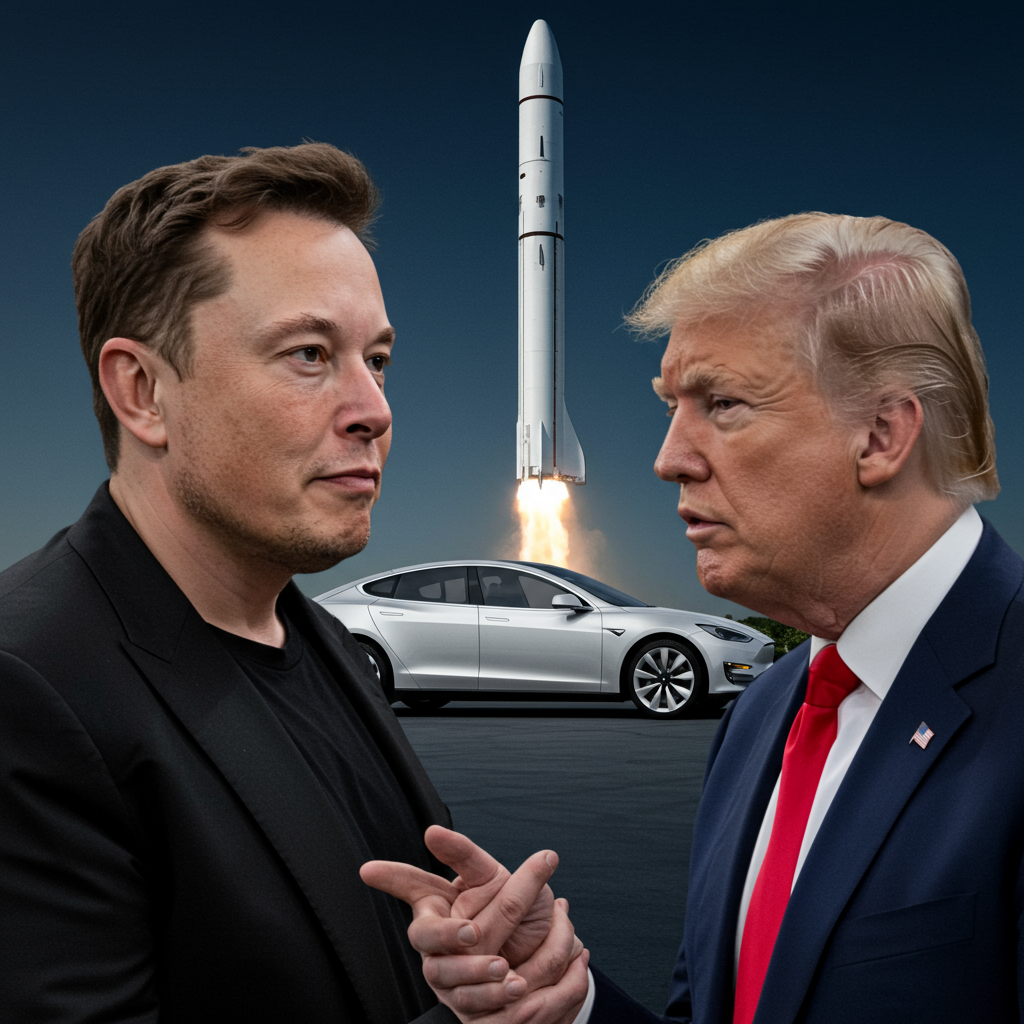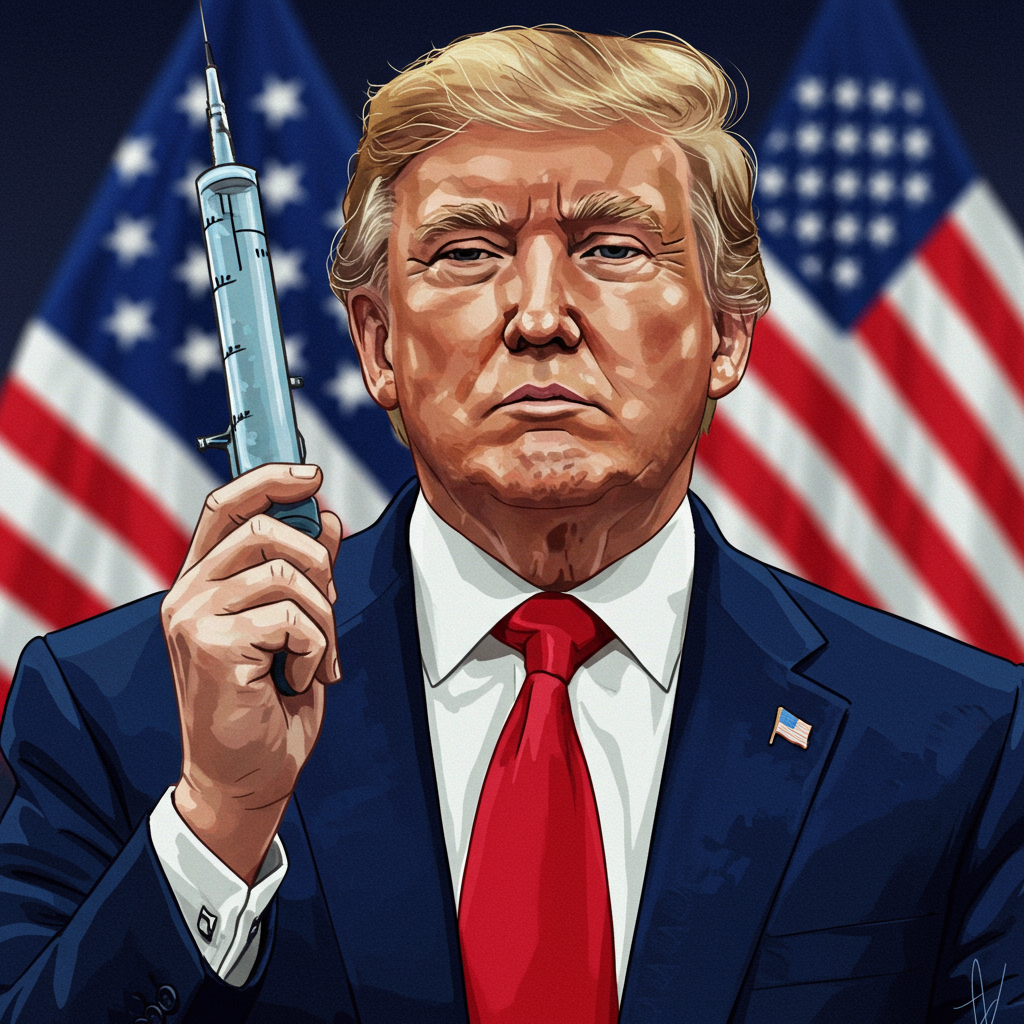Elon Musk, the billionaire entrepreneur behind Tesla, SpaceX, and X (formerly Twitter), recently found himself embroiled in a very public and acrimonious dispute with former President Donald Trump. This clash erupted just as investors had hoped Musk would step back from the political arena to focus on his sprawling business empire. However, the explosive row and the very public airing of political grievances suggest his attention may remain divided, raising significant questions about the potential fallout for his companies.
The immediate spark for the feud appears to be Musk’s strong public criticism of a key tax and spending bill championed by Trump. Musk took to social media, labeling the legislation a “disgusting abomination,” “outrageous, pork-filled,” and warning it would “massively increase the already gigantic budget deficit.” He urged Americans to pressure lawmakers to oppose the bill and even hinted at supporting efforts to unseat politicians who voted for it, stating, “In November next year, we fire all politicians who betrayed the American people.” This direct opposition, coming after Musk had advised the Trump administration on cost-cutting, marked a sharp turn in their previously aligned relationship.
Immediate Market Reaction and Investor Concerns
The public spat quickly sent ripples through the markets. Tesla shares saw a significant drop, falling 14% in a single day following Musk’s social media comments about Trump. While the stock later rebounded slightly, the volatility underscored long-standing concerns among investors and analysts who have repeatedly voiced their desire for Musk to reduce his political engagement and concentrate on boosting the performance of Tesla and his other ventures. Many see his public controversies as a distraction that adds unnecessary risk.
Veteran investor Ross Gerber, CEO of Gerber Kawasaki, a long-time Tesla holder who has reduced his position due to Musk’s political leanings, described the share drop as “extremely painful.” He characterized Musk’s public tirade against Trump as “the dumbest thing you could possibly do.”
Strategic Challenges Beyond the Political Stage
While the Trump feud grabbed headlines, some experts argue that the problems facing Musk’s companies run deeper. Veteran tech journalist Kara Swisher has expressed a pessimistic view on Tesla’s core automotive business, suggesting the company is “finished” as a car manufacturer and significantly “behind” competitors like Alphabet’s Waymo in the critical autonomous taxi sector.
The future value of Tesla is widely seen as tied to its success in autonomous technology. Wedbush Securities analyst Dan Ives estimates that autonomous driving and robotics could account for as much as 90% of Tesla’s future value. He highlights an upcoming launch of autonomous robo-taxis in Austin, Texas, as a potential “watershed moment” for the company. However, Musk’s publicly divided attention is viewed as potentially hindering the success of this crucial project. There is also speculation in Silicon Valley about whether Musk still possesses the same singular focus and drive that propelled Tesla and SpaceX in their earlier days.
Existing Headwinds: Protests and Performance
It’s also important to note that Musk’s businesses, particularly Tesla, were already facing significant headwinds before the latest political flare-up. A grassroots social media campaign, known as #TeslaTakedown, has organized protests against Musk and his company, ongoing since Trump took office. Protesters voice concerns ranging from Musk’s political influence to the perceived “weaponization” of Tesla’s stock.
These protests coincide with recent challenging financial performance for Tesla. The company reported a 20% drop in car sales and profits plunging over 70% in the first quarter of the year. Musk’s acquisition and management of the social media platform X have also drawn criticism, with detractors viewing it as a means for Musk to gain political “clout” and direct access to a massive audience, further intertwining his political activities with his business reputation.
The Threat of Government Contracts
A significant and potentially costly consequence of the Trump feud is the former President’s threat to cut Musk’s government contracts. These contracts are estimated to be worth a staggering $38 billion, with a substantial portion benefiting SpaceX. Trump publicly stated that the easiest way to save billions would be to “terminate Elon’s Governmental Subsidies and Contracts.” Commentator Noah Smith speculated that Trump’s recent moves, such as delving into cryptocurrencies, might reflect a desire to reduce his financial dependence on individuals like Musk.
However, executing such a threat may prove more challenging than it sounds. SpaceX, through programs like ferrying NASA astronauts and cargo to the International Space Station using its Dragon spacecraft, has become deeply integrated into the U.S. space and national security infrastructure. Similarly, Musk’s Starlink satellite internet service provides critical connectivity in various scenarios. Finding viable alternatives to these services might be difficult and time-consuming for the government.
This entanglement suggests that despite the personal animosity, a degree of mutual reliance between Musk’s companies and the U.S. government may persist. Musk himself seemed to recognize these limits during the spat, quickly backing down from an initial threat to decommission the Dragon spacecraft.
Potential for Image Rehabilitation?
Conversely, some analysts posit that the public break with Trump could potentially benefit Musk by helping to rehabilitate his image among individuals who were alienated by his previous alignment with the former president. Patrick Moorhead, chief analyst at Moor Insights & Strategy, suggests that America is a “very forgiving country” and that image recovery, while requiring time, is “not unprecedented.”
Kara Swisher drew a parallel to Microsoft co-founder Bill Gates, who was once seen as a divisive figure (“Darth Vader of Silicon Valley”) but has largely rehabilitated his public image over decades. Swisher suggests that personal change is possible, even if Musk is “clearly troubled.”
Uncertain Future
Ultimately, the future trajectory for Elon Musk’s businesses is likely to be complex, influenced not only by market dynamics and technological developments but also significantly by the ongoing political landscape and the actions of figures like Donald Trump. While the personal friendship between Musk and Trump appears to be over, their complex relationship, particularly concerning vital government contracts, may continue to shape the fortunes of companies like Tesla and SpaceX. The public clash adds another layer of uncertainty to an already volatile mix for one of the world’s most scrutinized business figures.
References
- https://www.bbc.com/news/articles/ceqgdnd2g9xo
- https://www.bbc.co.uk/news/articles/ceqgdnd2g9xo
- https://www.bbc.com/news/articles/c0j76djzgpvo
- https://www.bbc.com/news/articles/c5yg98rl717o



